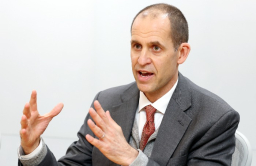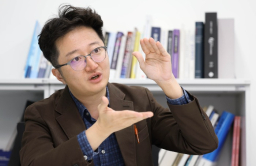-
KOSPI 2577.27 -2.21 -0.09%
-
KOSDAQ 722.52 -7.07 -0.97%
-
KOSPI200 341.49 +0.02 +0.01%
-
USD/KRW 1396 -2.00 0.14%
S.Korean investors eye VC, growth equity in tech: Adams Street
The country's VC market will see much growth in the coming years; private credit is also garnering attention, Managing Partner Jeff Diehl says
By
Feb 23, 2023 (Gmt+09:00)
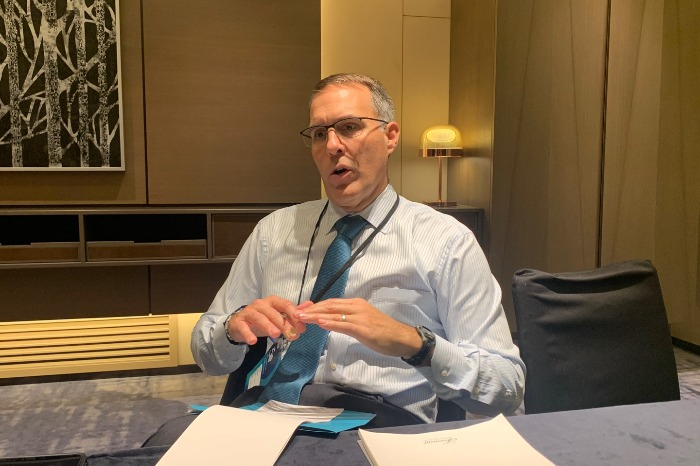
Many investors are questioning whether private markets will stay bullish amid uncertainty in 2023. The markets will continue to generate interesting opportunities, especially in venture capital and growth equity, said Jeffrey Diehl, managing partner and head of investments in Adams Street Partners LLC.
He advised investors to keep not-too-high exposure to illiquid assets and focus on what they can control. They should invest in fundamental growth for portfolio companies’ value, rather than using high leverage, he added.
Adams Street is a US asset manager for co-investment, growth equity, private credit, primary investments and secondary investments. The firm is 100% employee-owned and manages $52 billion in assets as of end-2022.
The following is a transcript of Diehl’s interview with The Korea Economic Daily earlier this month while he was in Seoul for an investor conference.
▲ How many times have you visited Korea? What is the key message you want to share with investors at the conference?
“I have been to Korea 10-15 times and will be back twice more this year. In terms of our investor conference, I think the most important message is that private markets can still generate very interesting risk-adjusted returns if you approach it properly and work with trusted advisors, even in times of uncertainty in financial markets and the geopolitical stage.”
▲ It has been five years since the opening of the Seoul branch office at the end of 2017. What kind of growth have you been experiencing in Korea?
“We have about 24 clients and a billion in total assets in Korea. We have three people in the Seoul office and I expect our client base and staff will grow in size in the next five years. We are very happy with the growth over the past five years in the country.”
▲ Which investment strategies and sectors have been of particular interest to Korean institutional investors?
“I think private credit seems to be of interest as well as venture capital and growth equity. We have investors across all five strategies in Korea and I expect it to continue. It depends on where in the market cycle we are in.
In terms of sectors, I would say technology. I think Korean institutional investors are comfortable with technology given the country has significant tech companies. Healthcare is the second on the list. We surveyed during the conference on the sectors they are interested in – technology topped and healthcare ranked second.
It is the same as in other geographies. We focus on tech and healthcare in the West; in Asia, we invest a lot in tech, healthcare plus business services.”
▲ You have focused on growth equity in the tech sectors, such as application software, financial technology and consumer internet. What are some trends or changes you have seen in this market since joining Adams Street in 2001?
“Some principles stay, for example, investing in companies that are in disruptive markets, gaining market share and generating interesting profits. That is still fundamental for Adams Street.
What has changed is the size of companies that are winners in their markets. That has become much bigger and the speed at which companies can access that scale is much faster. With mobile devices and cloud computing, the ability to reach large customer audiences is much easier today.
The second is a lot of that value creation for investors comes in private markets. It used to be companies would stay in the public market and grow in value, but today, more companies are staying private longer. To capture the upside, investors need to bet on private equity and that is very different than what it used to be in the past.
The third thing is that technology, which used to be vertical and sell software or hardware, has become horizontal. For example, Airbnb, the world’s largest hotel chain, doesn’t own a single hotel room. Uber, Didi and Lyft are the largest taxi companies but they don’t own any taxis. Technology is completely disrupting every industry and the opportunity says that tech investment has gone up enormously.
The last thing is that it has gone global. Innovation is happening in many more places than it used to. Automotives, electronics, consumer media and other sectors are experiencing a lot of innovations and it takes place globally.”
▲ Adams Street is a firm that specializes in co-investments, growth equity, private credit, primary investments and secondary investments. What differentiates Adams Street from other firms in these strategies?
“There are four things. Firstly, our strategy is to focus on sectors going through growth, dislocation and change. So we are not looking to invest in boring sectors that are growing at the gross domestic product (GDP) rate, but the sectors being disruptive.
Secondly, I think we do a very good job of underwriting and selecting investments. We have been around for 50 years in private markets and are very competitive to win deals – this allows us to get access to the best companies.
The third one is our risk management portfolio construction. We protect investors from getting too bullish or bearish in bad times.
The last thing is our employee ownership. Adams Street is 100% employee-owned so that helps us attract and retain great talent as everyone gets stakes in the company wherever they live in the world. It also affects our corporate culture, making it cooperative across all of our investment teams. This is critical to our success.”
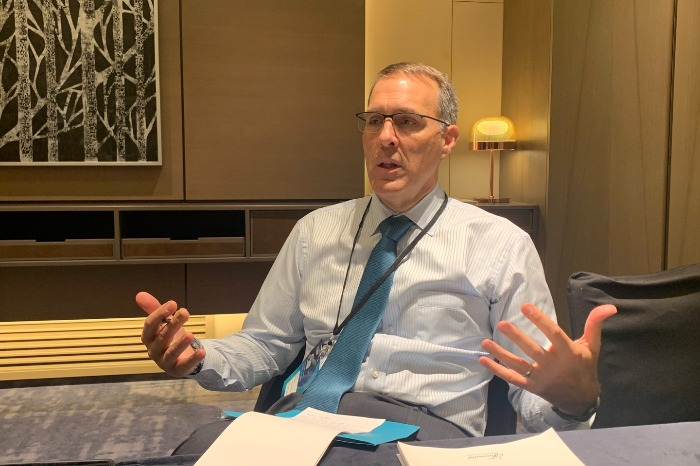
▲ Many predict that high-interest rates and inflation will continue this year. What are some themes or points you think are important in investing this year in times of uncertainty?
“Investors need to stay allocated to companies and sectors that can grow and provide essential needs. While most private equity firms have performed well over the last decade, some did so thanks to low-interest rates, a lot of leverage and valuation growth. Such investment firms need to generate the portfolio companies’ value from the fundamental growth of the underlying businesses.
While the recession can cause that growth to slow, ultimately people, businesses and consumers need the capabilities of that technology solution to make investments. I expect technology to be disruptive even if it is going through a slow time. Investors should try to avoid things that generate returns using financial markets rather than the fundamental operating businesses that can grow.”
▲ Which regions do you believe will show the opportunities in private equity? What are your thoughts on Asia, especially Korea?
“Private equity became most accepted early in North America, but has moved around the globe. The two principal strategies are venture capital and buyouts, which are active in Korea – I think autonomous automotive technology is the sector where Korea has expertise. The venture ecosystem is burgeoning and in four-five or 10 years, the Korean venture industry will be much more meaningful than what it is today.
A bigger question might be buyouts in some markets that could be big corporations and divisions. There will be many opportunities in Asia as more private equity firms buy listed companies, make them private, sell low-profit divisions and focus on growth. It culturally takes time to become accepted. We have seen that in Europe, it happened in the US and is taking time in Asia as well. I do think that it is becoming more prominent in the years ahead for Korea.”
▲ What efforts are being made regarding environmental, social and governance (ESG) investment?
“Our industry needs to define the criteria and the measures for ESG investment performance.
We have made a significant effort to work with the industry and come up with the appropriate standards to collect ESG-related data. So we have a long history of incorporating ESG into our investment process as we tend to be overweighted in tech and healthcare, which have higher ESG scores than the public market index such as the S&P 500. Our ESG committee deals with issues on investments and reports that back to clients.
Adams Street doesn’t have ESG-specific products today. We want to be very cautious about the ESG data before putting together a product as we don’t want to misrepresent something for our reputation. We are pushing to put standards in place and collect data and ultimately, ESG-specific products will emerge. Frankly, all products may become ESG products in our industry at some point.”
▲ Adams Street had a successful year in 2022. How was it able to have a positive year amid the slowdown in the private market?
“I am pleased to say that we met our fundraising targets for 2022. We raise money depending on how much high-quality investing capacity we have in each of our strategies and set up our targets.
We don’t have the end-of-2022 data yet but it was a difficult year in private markets. I look at mid-to-long-term returns as that is what matters in our asset class.
Our private credit business has done well. It was a very rough year for fixed income and some teams had negative returns. Equities had a difficult year in 2022 and private equity is no exception. We don’t disclose the specific returns of the funds based on our policy.”
▲ Many Korean individual investors are betting on global stocks today. What is your advice on their mid-to-long-term investment strategy?
“I would say they should choose an appropriate percentage of their illiquid assets. If something happens, they might be forced to sell at the wrong time. So, all I tell people is that private markets offer an appealing opportunity, but make sure that ‘set it and forget it’ as it might be difficult to sell it at the time you want.”
▲ Korean institutional investors are known for their conservative strategies. How would you advise them?
“I think Korean institutional investors are expanding their allocations to private equity and private credit. Previously, they did so in real estate and infrastructure which are more yield-based strategies, so I haven’t found them too conservative. I think they are appropriately moving into asset classes that offer higher returns today.
My advice to the investors is to make sure of appropriate allocation and liquidity to avoid having to sell in the secondary market. Also, picking high-quality, high-reputation managers is critical in every asset class.”
▲ A global slowdown is expected in 2023. What investment principles and plans does Adams Street have?
“Our investment strategy won’t change. We will be investing in the sectors that are going through growth and change, high-quality managers of companies and funds that we believe are well-positioned and drive value.
We are spending a lot of time analyzing the impact of inflation and potential slowdown, as well as making sure there is not too much debt in the businesses. This approach is steadily done through market cycles and we do not tend to vary our investment pace.
We do take advantage of opportunities that take place in the secondary market as a buyer. These times, when people are forced to sell their assets, are very attractive for secondary market investors.”
▲ What is your investment philosophy, and where do you get insights?
“I admire Warren Buffet. I have been going to the Berkshire Hathaway meeting for about 25 years. What I admire about his philosophy is that ‘do not worry about macro things, interest rates, GDP growth.’ All you can do is pick great businesses that are run by great management teams and when you find those, make sure you put in an appropriate amount of investment. The firm’s philosophy is to not worry about things you can’t control.
So I respect him although he doesn’t invest in technology as we do. His principles are true to what we do and we are just looking for growth in a way that is a little more aggressive than what he does.”
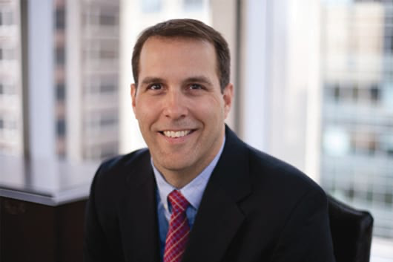
Before joining Adams Street, he served as a principal for the Parthenon Group, a Boston-based strategy consulting and principal investing firm with Bain Consulting roots.
Write to Jihyun Kim and Ji-Hye Min at snowy@hankyung.com
Jennifer Nicholson-Breen edited this article.
-
Jan 06, 2023 (Gmt+09:00)
-
Jan 02, 2023 (Gmt+09:00)
-
Jul 06, 2022 (Gmt+09:00)
-
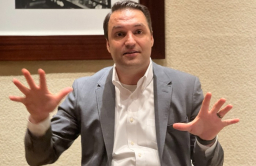 Asset managementPrivate markets embrace wider swath of economy: Partners Group CEO
Asset managementPrivate markets embrace wider swath of economy: Partners Group CEOJun 08, 2022 (Gmt+09:00)


